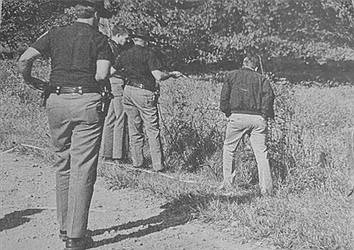Zoning code changes discussed
May 17, 2022 at 9:00 p.m.
The Franklin County Area Plan Commission (APC) discussed suggested updates to the county's zoning code at its May 11 meeting.
APC vice president Ed Derickson had compiled a list of inadequacies he has noticed in the code starting with regulations on the storage of commercial fireworks.
“All I'm asking is, look at our conditional uses, see if we need to make some improvements to it, add some things that would improve the safety and welfare of citizens in the county,” said Derickson.
APC member Ruthie Mannix asked Derickson if he has specific changes to the language of the code. Derickson replied he did not, he only wanted to encourage discussion, noting the board would take no action on the changes in the present meeting.
Derickson suggested the local fire department have some oversight over any commercial firework storage facility. APC member Patrick Bedel referenced the code's current text regarding manufacture and storage of explosives, which exempts consumer fireworks, section 80.06.04. Derickson noted the only thing he would change to that section would be to add approval of the local fire department and ensure adequacy of water mains servicing the area. Derickson also questioned the adequacy of the road accessing explosives storage facilities, noting the traffic issues at the tragic explosion near Whitcomb in 2020.
The next item on Derickson's list is changing the approval requirements of farm equipment and supplies facilities. Currently the use is permitted under a class two approval, by the APC director. Derickson suggested increasing that to a class three, requiring approval of the APC. Mannix noted as a commercial building, it would require state approval. Executive director Cindy Orshell replied a commercial building would require a review of the building design by the state.
APC member and county surveyor Rob Seig noted that state approval is of the building only and brought up concerns over how such a facility would impact drainage and erosion. Mannix mentioned recent suggestions of the need for a technical review board that would be implemented into the application process, which could include a drainage and erosion assessment by Seig. Seig expressed his interest in serving on the technical review board. Mannix suggested a technical review board could prevent several of the issues the APC has dealt with recently.
Mini-warehouses and self-storage facilities were addressed next. Mannix asked Seig if mini-warehouses represent a drainage concern; Seig replied in the affirmative. Derickson noted it requires class three approval in residential areas, but he thinks it should require class three approval regardless of the zone designation.
Derickson brought up produce stands, which are allowed without a permit. The primary concern being driveway access to the stands, while some stands Derickson has encountered had sufficient driveway and parking access. Other stands had no access with cars parking on the side of the road, presenting a potential traffic hazard. Mannix warned regulating produce stands can be a slippery slope, with some stands operating for only a couple of weeks. Seig suggested if something becomes a traffic hazard, it may become an issue for traffic control authorities to address.
“I certainly enjoy stopping by and picking up some fresh produce, I don't want to be overcumbersome for someone to do it, I just want to make sure there's safe access,” said Derickson.
Derickson brought up concerns about air pollution concerns with concentrated animal feeding operations (CAFO), citing research by University of North Carolina on the spread of pathogens between hog facilities. The county's code formerly had verbiage on air pollution, but it was removed and now only references state code requirements. Derickson suggested requiring a minimum distance of two miles between CAFOs. Seig noted recent outbreaks of avian flu have demonstrated the need for safe livestock practices. APC member Christine Rains reported on strict safety measures she has seen at poultry farms in Kentucky that have been implemented in response to the avian flu.
The APC next reviewed the code on riding stables. Mannix noted the need to expand on the code's definition for riding stable, which is currently quite vague.
“'Commercial venture wherein horses are stabled for riding or training,' it doesn't say anything about the number of the horses, It's a commercial venture, it could be your own horses are stabled for riding or training, are you boarding horses for riding or training?”
Derickson brought up seasonal hunting and fishing lodges. A commercial lodge requires class two approval, but few other regulations are in the text. Derickson suggested changing the approval requirements for welding shops to a class three and increased setback requirements. The next item of discussion was writing in a use specifically for automotive repairs and sales.
Derickson asked what role the comprehensive plan should play in the review of applications to the APC. Rains emphasized the need to give residents the opportunity to start a business. Mannix brought up concerns of the comprehensive plan itself, which was started after the Citizens' Input Committee zoning code was developed about ten years ago and was never finished.
Latest News
E-Editions
Events
The Franklin County Area Plan Commission (APC) discussed suggested updates to the county's zoning code at its May 11 meeting.
APC vice president Ed Derickson had compiled a list of inadequacies he has noticed in the code starting with regulations on the storage of commercial fireworks.
“All I'm asking is, look at our conditional uses, see if we need to make some improvements to it, add some things that would improve the safety and welfare of citizens in the county,” said Derickson.
APC member Ruthie Mannix asked Derickson if he has specific changes to the language of the code. Derickson replied he did not, he only wanted to encourage discussion, noting the board would take no action on the changes in the present meeting.
Derickson suggested the local fire department have some oversight over any commercial firework storage facility. APC member Patrick Bedel referenced the code's current text regarding manufacture and storage of explosives, which exempts consumer fireworks, section 80.06.04. Derickson noted the only thing he would change to that section would be to add approval of the local fire department and ensure adequacy of water mains servicing the area. Derickson also questioned the adequacy of the road accessing explosives storage facilities, noting the traffic issues at the tragic explosion near Whitcomb in 2020.
The next item on Derickson's list is changing the approval requirements of farm equipment and supplies facilities. Currently the use is permitted under a class two approval, by the APC director. Derickson suggested increasing that to a class three, requiring approval of the APC. Mannix noted as a commercial building, it would require state approval. Executive director Cindy Orshell replied a commercial building would require a review of the building design by the state.
APC member and county surveyor Rob Seig noted that state approval is of the building only and brought up concerns over how such a facility would impact drainage and erosion. Mannix mentioned recent suggestions of the need for a technical review board that would be implemented into the application process, which could include a drainage and erosion assessment by Seig. Seig expressed his interest in serving on the technical review board. Mannix suggested a technical review board could prevent several of the issues the APC has dealt with recently.
Mini-warehouses and self-storage facilities were addressed next. Mannix asked Seig if mini-warehouses represent a drainage concern; Seig replied in the affirmative. Derickson noted it requires class three approval in residential areas, but he thinks it should require class three approval regardless of the zone designation.
Derickson brought up produce stands, which are allowed without a permit. The primary concern being driveway access to the stands, while some stands Derickson has encountered had sufficient driveway and parking access. Other stands had no access with cars parking on the side of the road, presenting a potential traffic hazard. Mannix warned regulating produce stands can be a slippery slope, with some stands operating for only a couple of weeks. Seig suggested if something becomes a traffic hazard, it may become an issue for traffic control authorities to address.
“I certainly enjoy stopping by and picking up some fresh produce, I don't want to be overcumbersome for someone to do it, I just want to make sure there's safe access,” said Derickson.
Derickson brought up concerns about air pollution concerns with concentrated animal feeding operations (CAFO), citing research by University of North Carolina on the spread of pathogens between hog facilities. The county's code formerly had verbiage on air pollution, but it was removed and now only references state code requirements. Derickson suggested requiring a minimum distance of two miles between CAFOs. Seig noted recent outbreaks of avian flu have demonstrated the need for safe livestock practices. APC member Christine Rains reported on strict safety measures she has seen at poultry farms in Kentucky that have been implemented in response to the avian flu.
The APC next reviewed the code on riding stables. Mannix noted the need to expand on the code's definition for riding stable, which is currently quite vague.
“'Commercial venture wherein horses are stabled for riding or training,' it doesn't say anything about the number of the horses, It's a commercial venture, it could be your own horses are stabled for riding or training, are you boarding horses for riding or training?”
Derickson brought up seasonal hunting and fishing lodges. A commercial lodge requires class two approval, but few other regulations are in the text. Derickson suggested changing the approval requirements for welding shops to a class three and increased setback requirements. The next item of discussion was writing in a use specifically for automotive repairs and sales.
Derickson asked what role the comprehensive plan should play in the review of applications to the APC. Rains emphasized the need to give residents the opportunity to start a business. Mannix brought up concerns of the comprehensive plan itself, which was started after the Citizens' Input Committee zoning code was developed about ten years ago and was never finished.





